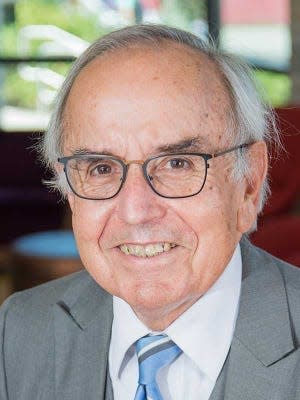Arthur Cyr: Cuba spying in strategic context
- Oops!Something went wrong.Please try again later.
- Oops!Something went wrong.Please try again later.
- Oops!Something went wrong.Please try again later.
On Dec. 4, the U.S. Federal Bureau of Investigation arrested a retired very senior diplomat. Victor Manuel Roca has been charged with spying for the government of Cuba over a period of many years.
U.S. Attorney General Merrick Garland stated, “This action exposes one of the highest-reaching and longest-lasting infiltrations of the United States government by a foreign agent.”
There are other disturbing examples of foreign agents in sensitive positions. In 1994, CIA officer Aldrich Ames was convicted of spying for Russia and the Soviet Union. In 2002, FBI agent Robert Hanssen was convicted of similar charges.

Both provided Moscow with enormous amounts of sensitive information, including the names of agents serving in that country. We don’t know for certain exactly how many lives were lost as a result of their treason.
Manuel Roca’s arrest provides a strong incentive to place Cuba’s challenge in current strategic context. Our hemispheric security requires new attention.
Fidel Castro exercised ruthless control of Cuba for nearly a half-century. After taking power in early 1959, enforcer brother Raul handled bloody mass executions with efficient dispatch.
Fidel highlighted new alliance with the Soviet Union by joining Nikita Khrushchev in a 1960 visit to the United Nations in New York. The Soviet premier was wildly disruptive at UN sessions, while the Cuban delegation provided a media sideshow, based at a Harlem hotel.
The Eisenhower administration began a clandestine effort to overthrow the regime, including a CIA project to assassinate Castro. The successor Kennedy administration vastly escalated such efforts.
Khrushchev secretly shipped long-range nuclear missiles to Cuba. The Cuban Missile Crisis of October 1962 resulted. President John F. Kennedy and Khrushchev managed to resolve the crisis short of war.
Cuba became an active far-reaching revolutionary force. The U.S. aggressively intervened against perceived threats, notably in Chile in the 1970s, where East Germany was influential. Cuban troops served as Soviet proxies in various Africa wars.
Cuba once boasted the strongest economy in Latin America, but this status changed quickly after Castro took power. The Soviet Union provided ongoing support. In May of this year, Havana and Moscow agreed on a plan designed to aid the weakening economies of both countries.
Efforts at improving relations have been frustrating. In March 2016, President Barack Obama visited Cuba. President Calvin Coolidge was the last U.S. chief executive to visit the island nation, in early 1928. Reflecting the outlooks, and transportation limitations, of that earlier era, President Coolidge travelled by battleship.
The Trump administration re-imposed a hard line. Soon after taking office, President Trump announced new trade and travel restrictions.
The Cuban government, increasingly hard-pressed, has carried out massive layoffs, combined with liberalization designed to encourage small business and foreign purchases of real estate. This is an admission of failure by Cuba’s committed Communist leaders. Havana now courts foreign investment, while maintaining political controls.
In the past, Cuba has been extremely important in U.S. presidential politics. Democratic presidential nominee Senator John Kennedy fanned the flames of hostility to Castro in the 1960 contest with Republican Vice President Richard Nixon.
In 2016, some Republicans strongly denounced the rapprochement with Cuba, but Republican Senator Jeff Flake of Arizona joined President Obama’s delegation. Bipartisan U.S. Congressional delegations continue to visit Cuba.
After Manuel Roca’s arrest, initiatives toward Havana must be cautious.
Most pressing is need to review and tighten U.S. security measures and methods. The Clinton administration deemphasized human intelligence in favor of electronic means.
We must reverse this change.
— Arthur I. Cyr is author of “After the Cold War” (NYU Press and Palgrave/Macmillan). Contact acyr@carthage.edu.
This article originally appeared on The Holland Sentinel: Arthur Cyr: Cuba spying in strategic context
